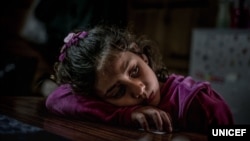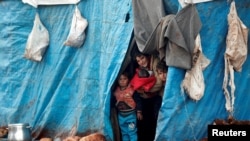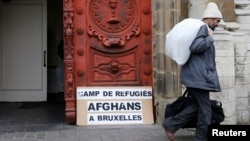International aid groups are warning countries hosting Syrian refugees in the Middle East and the West against forcing them to return to their war-torn country.
Leading humanitarian organizations, including the Norwegian Refugee Council and CARE International, a global alliance of relief groups, issued a report Monday highlighting the dangers Syrian war refugees will face, if they’re forcibly returned to a country still engulfed by vicious fighting.
“Hundreds of thousands of refugees are at risk of being pushed to return to Syria in 2018, despite ongoing violence, bombing and shelling that are endangering the lives of civilians,” the aid agencies said in the report entitled Dangerous Ground.
“Return would neither be safe nor voluntary for the vast majority who fled the war and the violence,” says Jan Egeland, secretary-general of the Norwegian Refugee Council. “Currently, even in certain so-called de-escalation areas, we've seen bloodshed, targeting of hospitals and schools, and death,” he added.
Syrian displaced
The United Nations say at least 300,000 Syrians, displaced earlier, have again fled fighting in the past few weeks in the northwestern province of Idlib, which has come under heavy air assault from Russian and Syrian warplanes.
The number of Syrian refugees who returned to their home country rose to 721,000 in 2017, from 560,000 the previous year, estimate the agencies. But the report warns that a further 1.5 million Syrians are expected to be displaced this year.
In countries bordering Syria, including Lebanon, Jordan, and Turkey, rhetoric on refugee return has picked up. “In Syria's neighboring countries, the push to return refugees has manifested itself in closed borders, deportations and forced or involuntary returns,” the report said.
More governments, many pushed by raising populist anger against migrants and widespread public fear of being swamped by foreigners, are planning repatriations, not just of Syrians but also those who have fled from other war-wrecked countries, including Afghanistan and Iraq, as well as economic migrants from sub-Saharan Africa.
Repatriations planned
Israel is planning to remove an estimated 20,000 migrants from Sudan and Eritrea, and in Italy parties in a powerful right-wing bloc are campaigning for more than a 100,000 migrants to be repatriated in the next 12 months.
If 2015 was the high-water mark of a migration crisis, especially when it came to Europe, 2018 could well become the year of repatriation, fear humanitarian workers. “Return and repatriation of refugees and migrants is high on the European political agenda,” the U.N. children's agency, UNICEF, warned in its latest bulletin on the refugee and migrant crisis in Europe.
In Italy, the country’s interior minister, Marco Minniti, a former intelligence chief, has been leading a left-wing charge to try to grab the migration issue away from right-wing rivals. In the process he has become the country’s most popular politician for forging deals with militias along Libya’s coast and tribes in the desert south to counter human smuggling.
He and the Italian government have denied they have provided funds to the militias to secure the deals. Meanwhile, a deal with Libya’s coastguards has seen asylum-seekers intercepted at sea and returned to Libya before even setting foot on Italian soil. Humanitarian groups have decried the interception of asylum-seekers, warning that those being turned back face appalling detention conditions in Libya.
International commitments
European countries have not since signing up to the 1951 U.N. Refugee Convention engaged in mass forcible repatriation of war refugees, but there have been increasing incidents of Afghan asylum-seekers being returned. The Afghans are not considered war refugees by the EU.
The convention stipulates that a refugees may not be returned if they fear their “life or freedom may be threatened” on account of their race, religion, nationality or membership of a particular social group or opinion. U.N. refugee guidelines also dictate that, once granted asylum, refugees may be returned forcibly only when conditions in their home have improved fundamentally.
In recent weeks Britain and other European countries have come under increasing pressure from the European Parliament to explain why they have been sending back to Afghanistan hundreds of Afghans whose asylum requests have been refused.
Since the European Union agreed to an aid package in 2016 with Afghanistan, which was tied to Kabul's willingness to take back refused asylum-seekers, involuntary repatriations have accelerated. The International Organization for Migration says 500 Afghans were forcibly removed to Afghanistan in 2017. Human rights activists say people sent home could be killed.
Iraqi officials have raised concern about plans in Europe for the forcible return of Iraqi refugees whose asylum petitions have been denied. Last month, Abdul Bari Zebari, chairman of the Iraq parliament’s foreign relations committee, urged the Iraqi government to refuse to enter any negotiations with EU countries concerning forcible repatriations of Iraqis.







